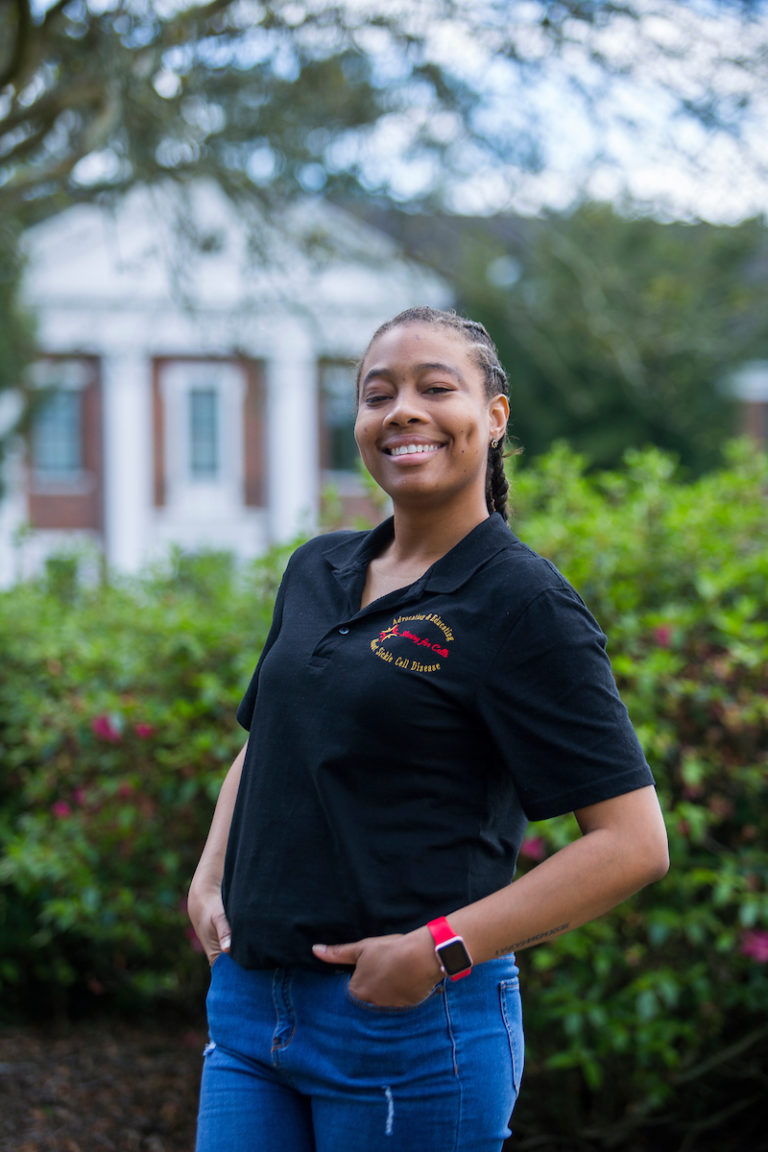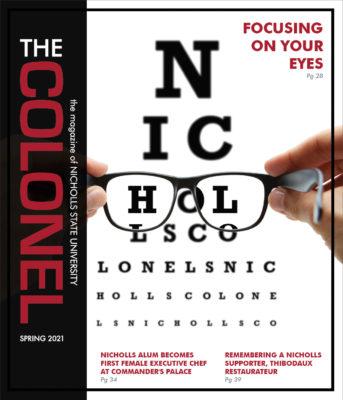Shining for Cells
When Ashantian Smith (BA ’20) packs for her family’s upcoming trip to Hawaii, she’ll pack cute outfits, shoes and jewelry to match. She’ll also pack two different doses of hydromorphone, hydrocortisone, muscle reliever, Icy Hot and allergy medicine for the hydrocortisone.
This is her life with Sickle Cell Disease. Doctors, friends and the media say she should not travel. She also should not drink soda, have kids and go to college.
But Smith is on a mission with three goals: to educate the general public about Sickle Cell Disease and to live life to the fullest. Oh, and to get on the Ellen Degeneres Show.
And in May 2020 she proved at least one of the recommendations wrong when she graduated from Nicholls State University.
“If I do get to have kids, I want them to know, just because society says you shouldn’t, it doesn’t mean you can’t,” she says. “I would rather go and get sick, than not go at all. At least I tried.”
What is Sickle Cell Disease?
Sickle cell disease affects almost 300 million people worldwide, most of them Black. The disease is caused by an abnormality in the red blood cells that causes them to take on a sickle-like shape.
There are four types of sickle cell disease. Smith has SS, or sickle cell anemia. It is characterized by painful episodes when the red blood cells cluster together and block blood from reaching organs and small blood vessels. These episodes are called crisis. Life expectancy is decreased as the disease worsens over time. Women with sickle cell anemia live to 48 years on average, about 30 years less than the average U.S. woman. Other symptoms include delayed growth, vision damage and a painful swelling in the hands or feet.
“It’s a sharp, throbbing pain. I always get chest pains. It feels like somebody is sitting on my chest,” she says. “I don’t know how to describe it other than it’s just a pain you don’t want to have.”
Crisis are spontaneous. Smith missed homecoming week when one struck on her way home from the Ochsner Medical Center in Kenner, where she works as a phlebotomist.
“They don’t make appointments. They come whenever they want,” she says. “I wish they could just work with me on my schedule, so we could plan them out in advance.”

Living with Sickle Cell Disease
Traveling is a family tradition. Mother Sharone Smith-McPherson (BGS ’99, MEd ’05) wanted her children to experience different states and cultures. Despite the doctor’s recommendations, that passion has passed down to Ashantian. She has flown to places such as the Dominican Republic and Los Angeles. But will isn’t always enough. A crisis once canceled a trip to Florida.
“One day she told me, ‘Mama, you only live once and I want to experience the world,’” she says. “We know she has a limit on her life. We know she has an expiration date. We want her to experience life to the fullest and experience everything she can.”
Travel isn’t the only area of life where her mother has influenced her. As she has progressed in school, her mom has always encouraged her to prioritize her school work, even when she’s been in the hospital. Ashantian chose to attend Nicholls because that’s where her mom went.
“I wanted to be like mom. I want to be a second-generation graduate,” she says. “My mom is my backbone. I have so much support and that feels good.”
But as the disease progresses, it can make it difficult to graduate high school, let alone college. According to the American Society of Hematology, high school students with Sickle Cell Disease graduate high school at a rate of 71 percent, well below the nationwide average of 85 percent. In Ashantian’s case, the amount of time she spent away from the classroom took away her ability to earn the TOPS scholarship.
But that didn’t stop her. The mass comm graduate wants to use her degree to advocate for sickle cell awareness on TV.
“You know the show Scandal? I want to be like Kerry Washington, except without the scandals. I want to work in the White House and be a fixer,” she says with a laugh. “I have big dreams, and I feel like Nicholls has prepared me for them.”
“If I do get to have kids, I want them to know, just because society says you shouldn’t, it doesn’t mean you can’t.”
– Ashantian Smith
Educating on Sickle Cell Disease
“I remember bringing you food, and seeing you in a lot of tears,” the young boy says, looking at the camera. “Sickle cell hurts you so much, but it also hurts the people around you to see you in so much pain.”
This is Ashantian’s younger brother B.J. in a video she uploaded to YouTube. It’s one of several videos she has published through her nonprofit Shining for Cells in an attempt to spread awareness about her disease.
The nonprofit was born during a negative experience at work after a coworker made a comment about a patient with sickle cell. “Most of them die at 40,” Smith recalls her coworker saying. “Do you think we all die when we turn 40?” Smith responded.
That incident serves as a reminder of the challenge she faces from the disease, and from the lack of awareness about her condition.
“If you’re an employee at a hospital and you’re that close-minded and you think that way then yeah, more people need to know about this,” Smith says. “One of the comments I get is, ‘You don’t look like you have sickle cell disease.’ I always ask them, what does that person look like?”
She chose to launch the group in September because it is Sickle Cell Awareness Month. Operations are small. Smith runs the nonprofit with help from her mother and grandmother. Though she calls it her “part-time baby,” the emotional connection is so strong that she refers to the group as “her.”
“Through her, I have met a lot of interesting people who have shared their stories,” she says. “We have so much in common, including the way we’re treated.”
Aside from the YouTube videos, Smith has appeared and spoken at hospital events across the state. She and her team have delivered food to the homeless, held raffles in September and every Thanksgiving, they put together care baskets for families of patients who are in the hospital suffering from Sickle Cell Disease. Her next project is to create a scholarship.
Her goal is to educate one person every day about sickle cell disease.
“If I can educate 365 people every year, then I think that’s pretty good,” she says. “I just want people to be open-minded about sickle cell patients. Every patient I have met has had the same negative experiences.”
Smith has a lot that she hopes to accomplish. But her number one dream is to be on the Ellen Degeneres show.
Her mother says, “We say that’s her long-term goal, but I think it may be short-term. For some reason, I think it’ll happen.”
Looking ahead
Smith has a message she shares with younger kids who have sickle cell disease: it’s okay.
“It’s okay to not play sports. It’s okay to miss the dance,” she says. “You’re going to ask how come everyone else gets to go places but you can’t. It’s okay. Life goes on. Don’t feel like you are behind.
Everything happens in due time. It’s not how you start but how you finish.”
Up next is to take that a step further and get her master’s from LSU. From there she’s unsure. Maybe Washington D.C. Maybe stay home. Maybe travel.
Wherever life takes her next, you can be sure that Smith is going to live it the way she wants.
– Jacob Batte



